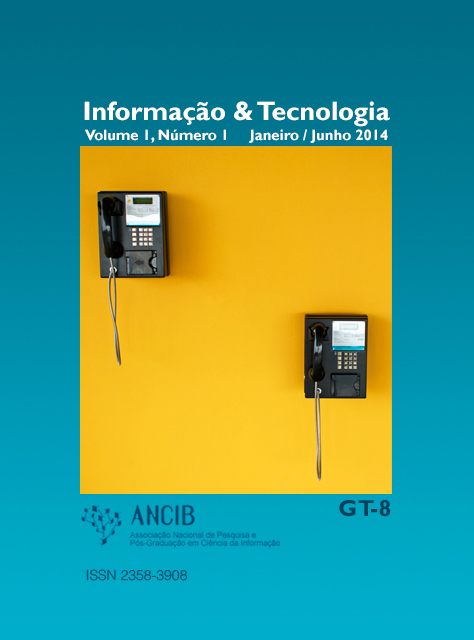WEAVING A CONCEPTUAL NETWORK IN INFORMATION SCIENCE: intellectual technologies for skills in information
Abstract
Presents the results of applying the conceptual network Wersig (1993) model to the issue of information literacy in the information system of the network society. Describes, from the notion of context Bunge (1980), a theoretical and conceptual framework based on the proposition Wersig and Neveling (1975) on the social responsibility of information science in contemporary society, which relate the intellectual constructs technologies and competences information in order to promote actions to develop information devices and artifacts of information on the Internet. Comments on the possible applications of this framework through integrated policy actions and information management.
Downloads
References
AMERICAN LIBRARY ASSOCIATION. Presidential Committee on Information Literacy. Chicago: ALA, 1989. Final report. Disponível em: <http://www.ala.org/acrl/nili/ilit1st.html>. Acesso em: 5 junho 2014.
BELLUZZO, R.C.B. A information literacy como competência necessária à fluência centífica e tecnológica na sociedade da informação: uma questão de educação. In: SIMPÓSIO DE ENGENHARIA DA PRODUÇÃO DA UNESP, 7, 2001. Anais... São Paulo: UNESP, 2001. Disponível em: <http://www.simpep.feb.unesp.br/ana8.html>. Acesso em: 3 junho 2014.
BUNGE, M. Epistemologia; curso de atualização. 2ed. São Paulo: T.A. Queiroz Ed., 1980
CASTELLS, M. A sociedade em rede. São Paulo: Paz e Terra, 1999.
COLLINS, H. M.; KUSH, M. The shape of actions: what humans and machines can do. Cambridge, Mass: MIT Press, 1999. p. 11-21.
DOYLE, C. Information literacy in information society: a concept for the information age. NY: ERIC Clearinghouse on Information & Technology; Syracuse University, 1994.
FREIRE, I.M. Caracterização das ações de informação no Laboratório de Tecnologias Intelectuais - LTi. Tendências da Pesquisa Brasileira em Ciência da Informação, v.5, n.1, 2012.
_____. A responsabilidade social da ciência da informação e/ou O olhar da consciência possível sobre o campo científico. 2001. Tese (Dout. Ci. da Inf.). RJ: Convênio CNPq/IBICT – UFRJ/ECO, 2001.
FREIRE, I.M., ARAUJO, V.M.R.H. de. A responsabilidade social da ciência da informação. Transinformação, v.11, n.1, jan./abr. 1999.
FREIRE, I.M.; FREIRE, G.H. de A. Ações para produção e compartilhamento de informação no Laboratório de Tecnologias Intelectuais – LTi. João Pessoa: UFPB, 2014. Inédito.
FROHMANN, B. Taking information policy beyond information science: applying actor network theory. In: ANNUAL CONFERENCE OF THE CANADIAN ASSOCIATION FOR INFORMATION SCIENCE / ASSOCIATION CANADIENNE DES SCIENCES DE L’INFORMATION, 23., 1995. Edmonton. Electronic proceedings… 14p. Disponível em: http://www.cais-acsi.ca/1995proceedings.htm ou < http://www.fims.uwo.ca/people/faculty/frohmann/actor.htm >. Acesso em: 10/5/2014.
GONZÁLEZ DE GÓMEZ, M.N. Novas fronteiras tecnológicas das ações de informação: questões e abordagens. Ciência da Informação, v.33, n.1, 2004.
_____. As relações entre ciência, Estado e sociedade: um domínio de visibilidade para as questões da informação. Ciência da Informação, Brasília, DF, v. 32, n. 1, p. 60-76, jan./abr. 2003.
_____. Dos estudos sociais da informação aos estudos do social desde o ponto de vista da informação. In: AQUINO, M. de A. (Org.) O campo da Ciência da Informação. João Pessoa: UFPB, 2002.
_____. Da política de informação ao papel da informação na política contemporânea. Revista Internacional de Estudos Políticos, v.1, n.1, p.57-93, 1999.
_____. Da organização do conhecimento às Políticas de Informação. INFORMARE – Cadernos do Programa de Pós-Graduação em Ciência da Informação, Rio de Janeiro, v. 2, n. 2, p. 58-66, jul./dez. 1996.
HATSCHBACH, M.H. de L. Information literacy: aspectos conceituais e iniciativas em ambiente digital para o estudante de nível superior. 2002. Dissertação (Mest. Ci. da Inf.). Rio de Janeiro: CNPq/IBICT – UFRJ/ECO, 2002.
KUHLTHAU, Carol. Inside the search process: information seeking from the user´s perspective. Journal of the American Society for Information Science, v.42, n.5, 1991.
LEVY, P. A conexão planetária. Rio de Janeiro : Editora 34, 2001.
_____. A inteligência coletiva: por uma antropologia do ciberespaço. 3. ed. São Paulo: Ed. Loyola, 2000.
_____. Cibercultura. São Paulo: Ed. 34, 1999.
_____. As tecnologias da inteligência. O futuro do pensamento na era da informática. Rio de Janeiro: Ed. 34,1994.
POPPER, K.R. Conjectures and refutations: the growth of scientific knowledge. 4th rev ed. New York: Basic Books, 1972.
SARACEVIC, T. Ciência da Informação: origem, evolução e relações. Perspectivas em Ciência da Informação, v.1, n.1, 1996.
WERTHEIN, Jorge. A sociedade da informação e seus desafios. Ciência da Informação, Brasília, v. 29, n. 2, p. 71-77, maio/ago. 2000.
WERSIG, G. Information Science: The study of postmodern knowledge usage. Information Processing and Management, v.29, n.2, p.229-239, 1993.
WERSIG, G.; NEVELING, U. The phenomena of interest to information science. The Information Scientist. v.9, n.4, 1975.



